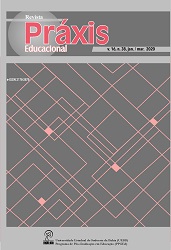THE FACTORS CREATING STRESS IN STUDENTS AND THE WAYS OF ERADICATING THEM
DOI:
https://doi.org/10.22481/praxisedu.v16i38.6014Keywords:
stress in students, factors causing stress, stress–management, teaching-training process, cognitive processesAbstract
In the article, the factors creating different character stress in students studying with bologna system and the role of emotional, volitional, cognitive processes in their management were investigated. It was indicated that since teaching process is rich with stressogenic factors they have influence to psychological and physical health of students. 200 respondents consisting of 1-3 year students studying in Natural and Humanitarian Faculties were involved in the investigation. Average age of subjects was 18-25. 96 out of them were women, while 104 were men. To say more precisely, 48% of the respondents were women, 52% were men. We compiled the investigation and validity was checked through pilotage investigation method through the following 5 questions: 1) Hierarchy of stress created in students based on the education and teaching problems; 2) Hierarchy of stress created in students by the problems regarding mood and health. 3) Hierarchy of stress created in students due to domestic problems; 4) “Investigation of vocationally self-regulation” by A.V.Zverkov və Y.V.Eydman”; 5) Ways-out of stress (stress-management); 6) In cognitive processes regulation of stress consisted of stress-management survey. It was indicated that investigating the character of stress factors, hierarchy, possibility of their correct management by self-regulation are important for creation of stress resistance and finally for increasing of students’ cognitive activeness and teaching accomplishments. In the article the relevant ways used for stress management and stress regulation by the students depending on the character of stress were revealed.
Downloads
Metrics
References
Antipov V.V. (2004). Psychological adaptation to extreme situations / V.V. Antipov. -
:Vlados. Press, p.174.
Arakelov, G. G. (2008). Stress factors affecting the formation of personality psychosocial stability during the student years / G. G. Arakelov, V. V. Arshinova, G. E. Zhdanova. // Psychological science and education. №2, p.52-60
Berezin F. B. (1988). Mental and psychophysiological adaptation of man. - L .: Nauka.
Bodrov V. A. (2006).Psychological stress: development and overcoming / V. A. Bodrov. M .: PER SE, p.528
Grimak L.P. (1989). Reserves of the human psyche. 2nd ed., Ext. - M .: Politizdat, p.319
Doskin, V. A. (1988). Prevention of exam stress / V. A. Doskin // School and
psychological health of students M., p. 147 – 160
Elkin A. (2005). Stress for dummies / A. Elkin M., p.311 – 313
Endler N. S.§ Parker J. D. A. (1994). Assessment of multidimensional coping: task,
emotion and avoidance strategies / Psychological Assessment. № 6. p. 50–60
Faustov, A. S. (2000). Education and health / A. S. Faustov, Y. V. Shcherbatykh. Voronezh, p.3-25
Garnefski N. § Ph. Kraaij § Spinhoven V. (2001). Negative life events, cognitive emotion regulation and emotional problems // Personality and Individual Differences. Vol. 30. p. 1311–1327.
Isard K.E. (2012). Psychology of emotions / - St. Petersburg: Peter, p. 464
Isen A.M. § Daubman K.A. § Nowicki G.R. (1987).Positive affect facilitates creative problem solving // Journal of Personality and Social Psychology. Vol. 52. p. 1122 – 1131
Kosyrev, V. N. (1983). The psychological mechanism of the influence of objective factors on the attitude of students to study / V. N. Kosyrev. // Formation of a positive attitude towards learning activities among students. - Tambov: TSPI, p.23-24
Kryukova T. L. (2007). Methods of studying coping behavior: three coping - scales. - Kostroma: Avantitul, p 60.
Leonova A. B. (1984). Psychodiagnostics of functional states of a person. M .: Moscow Publishing House. un-that. p.200
Pisareva O.L. § Gritsenko A. (2011). Cognitive regulation of emotions / Philosophy and social sciences: Scientific journal. No. 2. - p. 64-69
Simonov P.V. (1998). Lectures on the work of the brain. Demand-information theory of higher nervous activity. Collection of 5 lectures. M.
Shafiyeva E.I. (2001). The problem of the health of adolescents and youth in modern conditions. Materials of scientific-research conference dedicated to 10th jubilee of Social sciences and psychology faculty of Baku State University, Baku, December, p.85
Shafiyeva E.I. (2010). Ways of formation of stress resistance in employees. Actual problems of operational psychology and psychological support of operational activities ”. XX International Scientific and Practical Conference. Minsk, October 14-15, p. 32-43
Shafieva E.I. (2010). The first psychological assistance in extreme situations. “Modern problems of moral-psychological provision in training of navy cadres and extreme psychology ”, Baku, March 3, p. 51-57
Shafiyeva E.İ. (2012). Influence of stress and interpersonal relations’ conflict on mental health of militarymen. The News of Baku State University. Series of social-political sciences., No 2, p. 128-136
Shafiyeva E.I. (2014). Factors forming the mood of person “Education, personality and society”. Materials of Republican confrance dedicated to 95th anniversary of foundation of BSU, Baku. p. 121-126
Shcherbatykh, Y. V. (2000). Exam and student health / Yu. V. Shcherbatykh. Voronezh, p.5-118
Shcherbatykh Y. V. (2000). Exam and student health / Y. V. Shcherbatykh // Higher education in Russia. No. 3, p.111 - 115
Shcherbatykh, Y. V. (2008). Stress Psychology and Correction Methods - St. Petersburg: Peter, p.256.
Yusupov M. G. (2009). Interaction of mental states and cognitive processes during the educational activities of students: dissertation work of cand. of psychol. sciences: 19.00.01 / M .; KFU.– Kazan, p.201
Downloads
Published
How to Cite
Issue
Section
License
You are free to:
Share - copy and redistribute the material in any medium or format; Adapt - remix, transform, and build from the material for any purpose, even commercially. This license is acceptable for Free Cultural Works. The licensor cannot revoke these freedoms as long as you follow the terms of the license.
Under the following terms:
Attribution - You must appropriately give credit, provide a link to the license, and indicate if any changes have been made. You may do so in any reasonable way, but not in a way that suggests that you or your use is endorsed by the licensor.
There are no additional restrictions - You cannot apply legal terms or technological measures that legally restrict others to make any use permitted by the license.










